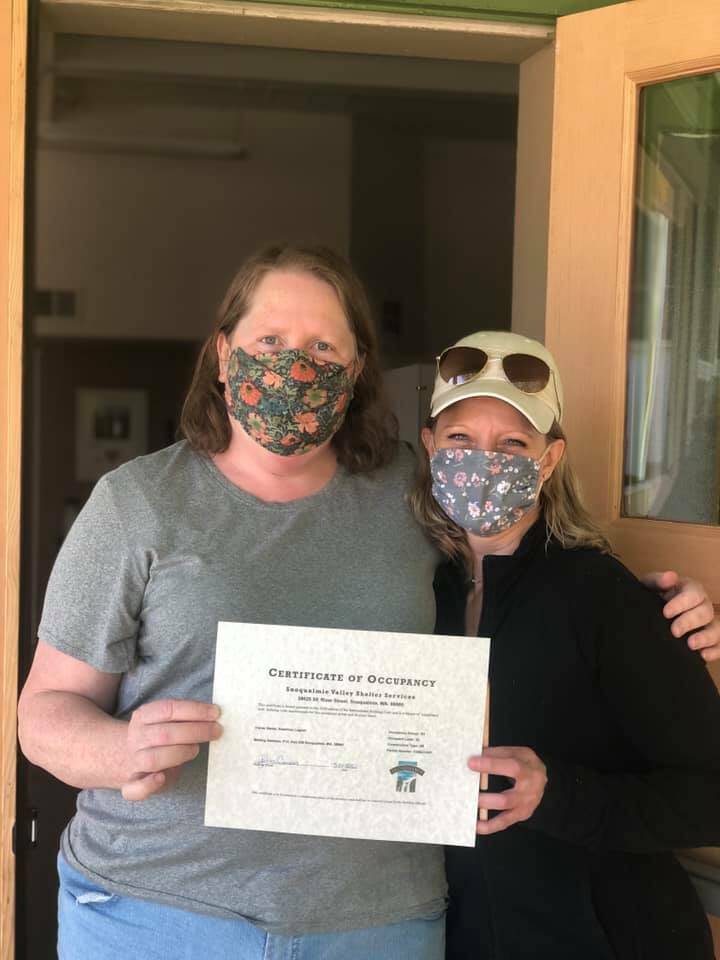If it were this time last year, staff at the Snoqualmie Valley Shelter Services (SVSS) would have been scrambling to prepare for the upcoming winter — reaching out to churches, leasing out spaces, training volunteers and budgeting how long they would be able to provide overnight shelter for unhoused residents in the Snoqualmie Valley.
Now, as the shelter has made the transition to a year-round 24/7 shelter, and had its budget doubled to meet growing demand, staff and residents no longer have to worry about where they will be this winter.
“It’s amazing to not stress about whether I will be in survival mode this winter,” said one resident using the shelter’s motel voucher program. “For the first time in many years, I can feel secure knowing I’ll be indoors.”
To support the growing demand and its ongoing programs, the shelter is launching the Reclaiming Stability fundraiser. Organizers of the weeklong virtual fundraiser, which begins Nov. 8, hope to raise $100,000 that will go directly to programs and services to benefit unhoused residents in the valley.
Each day of the fundraiser will include stories about work done at the shelter and will highlight a different program. It will be the largest fundraiser in the shelter’s history.
Like nearly all shelters in King County, SVSS has been operating at maximum capacity for months and continues to operate at reduced capacity due to pandemic precautions. To meet the need, the shelter’s budget has grown to $1.3 million.
“It’s exciting and very daunting,” said Jennifer Kirk, the shelter’s executive director. “It’s a huge responsibility with a budget that high.”
The increase in budget and available services at the shelter has made an immediate impact on its clients, Kirk said. As a 24/7 year-round shelter, residents can stay as long as they need, until they find stable housing, without fear of having their spot taken.
“[Residents] are able to rest. They are able to compile their thoughts again and recover from homelessness,” Kirk said. “We noticed an immediate difference in people’s demeanor.”
The additional funds and space alone are still not enough to help everyone. The shelter is often referring residents to other agencies due to space and budget constraints.
“Emotionally, it’s really difficult to tell people we don’t have space,” Kirk said. “Oftentimes by the time they’ve called us, they’ve called other resources and gotten the same answer. It feels really defeating. We’re happy to be year-round, but every shelter I know still can’t meet the need.”
Need may also grow, as the state’s eviction moratorium, outside of Seattle, is set to expire Oct. 31. Kirk said she is unsure what impact this will have, but said it remains a stressor and could result in the shelter getting more calls.
Despite this, the shelter is still finding ways to support unhoused residents, even those not within its own walls. In September, the shelter started an Amazon wish list asking for donations to provide those sleeping outside with blankets, sleeping bags, tents and other supplies until space in the shelter becomes available.
The shelter currently has 10 permanent beds and five emergency beds prioritized for single-adults. It also offers 15 permanent motel vouchers prioritized for families to stay in almost any motel in the county.
The biggest change in service is the new 11 Emergency Housing Vouchers provided by the county’s Regional Homelessness Authority and American Rescue Plan. The vouchers allow the shelter to place Snoqualmie Valley residents in permanent supportive housing in their own community.
“It’s unprecedented for our area to be able to provide that amount of Emergency Housing Vouchers,” Kirk said. “Now, the challenge will be finding landlords or management companies that will partner with us to get our folks housed.”
Through the program, residents will be offering housing and support services, including case management, for a minimum of a year. Residents can also be moved to anywhere in the country with the voucher if they have a better support system elsewhere.
Kirk emphasized the importance of volunteers in the shelter’s success. In August, the shelter was asking for volunteers to provide meal donations, with only half of its available meal slots full. Now, Kirk said the meal calendar is full for the foreseeable future.
“We’re hoping to get assistance from this amazing community of ours,” she said. “We couldn’t do any of this without our volunteers.”
To support the shelter, visit svshelterservices.org/support-us.html or facebook.com/SVShelterServices.



